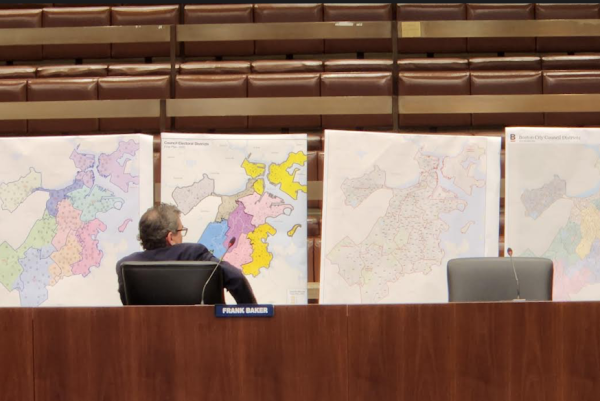May 8, 2023

Councillor Frank Baker studied a series of proposed maps during a hearing at City Hall on Friday, Oct. 7,2022. Gintautas Dumcius photo
The City Council must make another attempt at redrawing the political boundaries of its nine district seats, a US federal judge ordered on Monday.
Councillors verbally sparred for months last fall before a 9-4 vote on a map that sliced up Dorchester-based District 3, particularly the Neponset area.
Opponents of the map “demonstrated a likelihood of success” in their lawsuit arguing that race wrongly played a predominant role in the redistricting, as the redrawing process is known, US Judge Patti Saris wrote in granting map opponents a preliminary injunction.
“The ball is back in the City Council’s court,” she wrote.
The judge’s decision also blocks the city of Boston from using the map in this fall’s elections. The decision comes as Council candidates are out gathering voter signatures and incumbent councillors are in the thick of hearings on the city's annual budget.
Councillors redraw the political boundaries every ten years in a typically contentious process. This past cycle, councillors were faced with redrawing a map that accounts for a population boom in South Boston-based District 2, and a population loss in District 3.
“In my view, the City Council is best positioned to redraw the lines in light of traditional districting principles and the Constitution,” Saris wrote. “The role of race in redistricting is complicated and in flux, and the Court finds that the City Council acted in good faith in trying to comply with complex voting rights laws.”
The map opponents who pressed for the preliminary injunction included Maureen Feeney, the former city clerk and District 3 councillor; the St. Vincent’s Lower End Neighborhood Association; and Rasheed Walters, a District 4 resident who has written for the Boston Herald.
The named defendants in the lawsuit include Mayor Michelle Wu and the City Council, though the four councillors who voted against the enacted map have supported efforts to overturn it. A Wu administration spokesperson said on Monday night they are reviewing the decision.
District 2 City Councillor Ed Flynn, District 3 Councillor Frank Baker and City Councillor At-Large Michael Flaherty have funneled money towards lawyers waging the battle against the map in court, while Councillor At-Large Erin Murphy took the stand to testify against the enacted map, as did Flaherty and Flynn.
“I am pleased with the ruling because it supports my long-held belief that this map unfairly robbed District 3 and the citizens of Boston of its voice and was designed to weaken its position in Boston politics," Baker said in a statement. "Gerrymandering is gerrymandering -- whether in pursuit of progressive or conservative goals."
The enacted map unified the Vietnamese community in Fields Corner, also known as “Little Saigon,” by moving precincts 16-1 and 16-3 from District 4 to District 3, and unified the Roslindale neighborhood by shifting two precincts to District 5 from District 4. (Mayor Wu backed both moves.) The enacted map also split public housing developments between District 3 and District 2.
But the move that caused some of the largest protests from parts of the Dorchester neighborhood involved the splitting of Adams Corner/Adams Village, an area that includes white super-voters.
"[T]he Court finds a likelihood of success on the claim that race predominated the City Council’s decision to move four precincts with largely White super-voters from District 3 to District 4," Saris wrote in her decision.
"Judge Saris's ruling today is a victory for transparency, accountability, and the people of the City of Boston," Murphy said in a statement. "The United States District Court identified a deeply flawed process, and I welcome the opportunity to join my colleagues in rewriting more equitable districts that protect our constituents' Constitutional rights."
The enacted map also flipped Fields Corner schoolteacher and pastor Joel Richards from District 4 to District 3.
Richards, who lives in Ward 16-Precinct 1 and ran for the District 4 seat in 2021, launched his campaign for District 3 in December. The race is now wide open after Baker announced he wouldn’t seek another two-year term and other candidates are piling in.
Richards said the judge’s decision doesn’t change anything for him, and he plans to keep campaigning in District 3. “Every new map that came out had me in District 3,” he said of last fall's redistricting process. “I don’t see anything different for me.”
This post has been updated with quotes from the decision and Joel Richards.
Topics:



